- Home
- Scott Westerfeld
Stupid Perfect World Page 4
Stupid Perfect World Read online
Page 4
As the cold gripped my body, I finally believed those books where heroines died from wandering around outside. Maybe it had only taken a cold rain to kill them back then, but the Antarctic wind made the whole thing much more plausible. Every breath shredded my lungs, my wet hair making cracking noises inside the parka hood.
My bioframe was threatening to call for medical attention, but I ignored it—Kieran always bragged that emergency response took long minutes here. I kept trudging, slitted eyes focused on the distant igloo.
The hard-packed snow gave way to knee-high drifts, and snow rolled in over the tops of my boots, numbing my feet. I stumbled and was forced to pull my hands out of their warm pockets for balance. If I fell down, I’d shatter like a dropped icicle.
My brain was growing fuzzy, my heart pounding sluggishly, the world shrinking to the little tunnel of the parka hood.
Then a brilliant star flared before me…
A human shape was making its way around the igloo, waving a gout of flame across the curved surface of the ice. My freeze-dried brain remembered Kieran saying something about a blowtorch.
I tried to call to him, but my lungs could only suck the tiniest gulps of air, like breathing ice cubes. My body kept moving, driven forward by the promise of the glowing ember in Kieran’s hands.
Fire was hot—I recalled this fact from some pre-Antarctic existence.
I staggered on until I was close enough to feel the warmth. My bare hands reached out for the flame, my fingertips slightly blue.
Kieran finally heard my snow-crunching footsteps and turned to face me, letting out a yelp of surprise.
“Maria! What are you…?” The torch fell from his hands into the snow, where it sputtered and died.
I fell to my knees beside it, groaning with disappointment. I reached for the still-glowing metal…and then Kieran’s hands were around my shoulders, and I wanted to kill him for dragging me away from that sliver of leftover heat.
Through the tunnel of my parka hood, I watched my boots skidding across the snow until the pale sunlight darkened. Suddenly it was warm, gloriously hot, maybe even above freezing! My hood was pushed back, Kieran’s concerned and goggled face in front of me, the inside walls of the igloo shimmering with artificial light.
“What are you doing here?” He pulled off his goggles and parka, stripping off his tempsuit right in front of me. “Are you crazy?”
Half naked, he wrapped the silver tempsuit around me, its elements burning my skin like hot coals. I could only nod and stare. It felt like my eyes would shatter if I blinked.
“Came see you,” I managed.
“I’m so sorry,” he said. “I never dreamed about Barefoot, never once! It was you from that very first night!” He swallowed. “But it was so weird and incredible, and everyone always said that dreams weren’t real. But they are sometimes…. Do you know what I mean?”
“Yesh,” I assured him through cracked lips. There was more in heaven and earth and all that…so much more to say.
But just then, my frantic bioframe realized that I’d reached somewhere warm and safe, and so dutifully knocked me out, not wanting to risk me freezing myself again.
Stupid perfect world.
Nine
SO HERE WE ARE at the end of our little adventure,” Mr. Solomon began.
Barefoot Tillman sneezed in her quarantine corner. She’d been much better the last couple of days; the goo had stopped running from her nose. But everyone still kept their distance.
“Gesundheit,” Maria said, having looked up a few old traditions on Barefoot’s behalf. We smirked at each other.
“But before we all return to the modern world, perhaps we should share about our experiences.” He spread his hands. “Anyone?”
Lao Wrigley raised her hand. “Well, I feel like I got much closer to my father.”
“Hmm,” Mr. Solomon said. “Because you made him fly you to and from the Bahamas every day?”
“Necessity is the mother of invention.” Lao flicked her hair.
“Check out these abs!” Sho cried, standing up in the front row, spinning around and lifting his shirt. “I may never eat again.”
“I doubt that,” Mr. Solomon said. “And I believe those are ribs, Mr. Walters, not muscles. Anyone else with profundities to share? Yes, Mr. Stratovaria?”
“Well,” Dan said, “I’ve discovered that there’s nothing funny about parasites.”
“Ah, insight from the sightless. Someone, at least, appreciates the seriousness of scarcity. Perhaps this semester hasn’t been entirely wasted.”
“No kidding,” Dan said, waving his cane in one white-veined hand. “My mom’s so freaked out, she’s shelling out big-time for the replacements. My new eyes are going to kick ass!”
Mr. Solomon sighed. “Indeed. And is there any great wisdom from you two lovebirds holding hands in the back?”
We pulled apart as everyone spun around, still quizzical at the two of us together. My friends blamed William Shakespeare for turning me into a meeker. They rolled their eyes at the old-speak that sometimes burbled out of my mouth.
But the changes had come from a place more primeval than they thought. The Bard had nothing on my subconscious.
“Well, Mr. Solomon,” Maria said, “I learned that those olden-day heroines weren’t nearly as wimpy as I thought. Turns out you really can die from running around outside in the cold. Especially if you’re wet.” With her free hand, she pointed to the dark patch of frostbite on her left cheek, which shone like a misplaced black eye. Her mother had made Maria promise to get a skin graft soon, but in the meantime she was seriously milking it.
“Fascinating,” Solomon said. “Though perhaps not as relevant to your original project as one might hope.”
“Oh, I assure you, Mr. Solomon,” Maria said. “Unbalanced hormones and Antarctic exposure go hand in hand.”
“An interesting observation. And you, Mr. Black? What have you to tell us about the rigors of sleep?”
What indeed? I took a deep breath, wondering what I was going to do after class ended today. Now that the final projects were over, I could reset my bioframe, switch on all those little nanos that would make my anabolic and catabolic processes simultaneous once more—no need to sleep ever again.
Did I still want my dreams? They weren’t so different from real life, now that Maria and I had connected out here in the waking world. But I kept wondering what else they might show me, what magic would be lost if I never twitched and blinked my way through Stage 5 again.
“I’m glad I tried it, Mr. Solomon.”
“Did you make it all the way down to REM sleep?”
“You bet,” I said. “Dreams, rapid-eye movement, drool, the whole deal.”
Maria shot me a sly look. We’d decided not to mention that she’d dreamed once, too, courtesy of acute hypothermia, combined with a little knock-out juice from her bioframe. Or to tell Solomon that my hormones had followed hers out of balance, since modern-day widgets weren’t calibrated for someone sleeping six hours a night. I’d gone mad enough to have teleported to a deluge in Denmark the night before, just to hold Maria’s hand in the freezing rain.
Our projects had overlapped in all kinds of interesting ways.
“And what exactly did you dream of, Mr. Black?” Solomon asked.
Maria reached over to squeeze my hand again, fingernails biting flesh.
“Scarcity, Mr. Solomon,” I said. “War, pestilence, famine. All the slings and arrows of outrageous fortune that this world does not allow.”
“Really?” He raised an eyebrow. “Nightmares is the old term, I believe. So you must be relieved to be here at the end.”
“Most definitely,” I said, hearing the sound of Maria scribbling in her notebook, tangling more words and images inspired by my lies. And I decided: no adjustments to my bioframe this afternoon, not yet.
At least one more night of dreams.
Excerpt from Midnighters
Nobody is safe in the secret
hour….
Read on for a peek at Scott Westerfeld’s Midnighters
1
8:11 A.M. REX
The halls of Bixby High School were always hideously bright on the first day of school. Fluorescent lights buzzed overhead, their white honeycombed plastic shields newly cleaned of dead insect shapes. The freshly shined floors dazzled, glinting in the hard September sunlight that streamed in through the school’s open front doors.
Rex Greene walked slowly, wondering how the students jostling past him could run into this place. His every step was a struggle, a fight against the grating radiance of Bixby High, against being trapped here for another year. For Rex summer vacation was a place to hide, and every year this day gave him the sinking feeling of having just been discovered, caught, pinned like an escaping prisoner in a searchlight.
Rex squinted in the brightness and pushed up his glasses with one finger, wishing he could wear dark shades over their thick frames. One more layer between him and Bixby High School.
The same faces were all here. Timmy Hudson, who had beaten him up just about every day in fifth grade, passed by, not giving Rex a second glance. The surging crowd was full of old tormentors and classmates and childhood friends, but no one seemed to recognize him anymore. Rex pulled his long black coat around himself and clung to the row of lockers along the wall, waiting for the crowd to clear, wondering exactly when he had become invisible. And why. Maybe it was because the daylight world meant so little to him now.
He put his head down and edged toward class.
Then he saw the new girl.
She was his age, maybe a year younger. Her hair was deep red, and she was carrying a green book bag over one shoulder. Rex had never seen her before, and in a school as small as Bixby High, that was unusual enough. But novelty wasn’t the strangest thing about her.
She was out of focus.
A faint blur clung to her face and hands, as if she were standing behind thick glass. The other faces in the crowded hall were clear in the bright sunlight, but hers wouldn’t resolve no matter how hard he stared. She seemed to exist just out of the reach of focus, like music played from a copy of a copy of an old cassette tape.
Rex blinked, trying to clear his eyes, but the blurriness stayed with the girl, tracking her as she slipped further into the crowd. He abandoned his place by the wall and pushed his way after her.
That was a mistake. Now sixteen, he was a lot bigger, his dyed-black hair more obvious than ever, and his invisibility left him as he pushed purposefully through the crowd.
A shove came from behind, and Rex’s balance twisted under him. More hands kept him reeling, four or five boys working together until he came to a crashing stop, his shoulder slamming into the row of lockers lining the wall.
“Out of the way, dork!” Rex felt a slap against the side of his face. He blinked as the world went blurry, the hall dissolving into a swirl of colors and moving blobs. The sickening sound of his glasses skittering along the floor reached his ears.
“Rex lost his spex!” came a voice. So Timmy Hudson did remember his name. Laughter trailed away down the hall.
Rex realized that his hands were out in front of him, feeling the air like a blind man’s. He might as well be blind. Without his glasses, the world was a blender full of meaningless color.
The bell rang.
Rex slumped against the lockers, waiting for the hall to clear. He’d never catch up with the new girl now. Maybe he’d imagined her.
“Here,” came a voice.
As he raised his eyes, Rex’s mouth dropped open.
Without glasses Rex’s weak eyes could see her perfectly. Behind her the hall was still a mess of blurred shapes, but her face stood out, clear and detailed. He noticed her green eyes now, flecked with gold in the sunlight.
“Your glasses,” she said, holding them out. Even this close, the thick frames were still fuzzy, but he could see the girl’s outstretched hand with crystal clarity. The Focus clung to her.
Finally willing himself to move, Rex closed his mouth and took the glasses. When he put them on, the rest of the world jumped into focus, and the girl blurred again. Just like the others always did.
“Thanks,” he managed.
“That’s okay.” She smiled, shrugged, and looked around at the almost empty hall. “I guess we’re late now. I don’t even know where I’m going.”
Her accent sounded midwestern, crisper than Rex’s Oklahoma drawl.
“No, that was the eight-fifteen bell,” he explained. “The late bell’s at eight-twenty. Where’re you headed?”
“Room T-29.” She held a schedule card tightly in one hand.
He pointed back at the doorway. “That’s in the temps. Outside on the right. Those trailers you saw on the way in.”
She looked outside with a frown. “Okay,” she said hesitantly, like she’d never had class in a trailer before. “Well, I better get going.”
He nodded. As she walked away, Rex pulled off his glasses again, and again she jumped into clarity as the rest of the world became a blur.
Rex finally allowed himself to believe it and smiled. Another one, and from somewhere beyond Bixby, Oklahoma.
Maybe this year was going to be different.
Rex saw the new girl a few more times before lunch.
She was already making friends. In a small school like Bixby, there was something exciting about a new student—people wanted to find out about her. Already the popular kids were staking a claim to her, gossiping about what they’d learned about her, trading on her friendship.
Rex knew that the rules of popularity wouldn’t allow him near her again, but he hovered nearby, listening, using his invisibility. Not really invisible, of course, but just as good. In his black shirt and jeans, with his dyed-black hair, he could disappear into shadows and corners. There weren’t that many students like Timmy Hudson at Bixby High. Most people were happy to ignore Rex and his friends.
It didn’t take Rex long to find out a few things about Jessica Day.
In the lunchroom he found Melissa and Dess in the usual place.
He sat across from Melissa, giving her space. As always, her sleeves were pulled down, almost covering her hands against any accidental touch, and she wore headphones, the hiss of metal power chords audible from them like an insistent whisper. Melissa didn’t like crowds; any sizable number of regular people drove her crazy. Even a full classroom tested her limits. Without headphones she found the bickering, striving chaos of the lunchroom unbearable.
Dess ate nothing, didn’t even push her food around, just folded her hands and peered at the ceiling through dark sunglasses.
“Here again for another year,” Dess said. “How much does this suck?”
Rex reflexively started to agree but paused. All summer he had dreaded another year of awful lunches, hiding from the blazing skylights here in the dimmest corner. But for once he was actually excited to be in the Bixby High lunchroom.
The new girl was only a few tables away, surrounded by new friends.
“Maybe, maybe not,” he said. “See that girl?”
“Mmm,” Dess answered, her face still raised to the ceiling, probably counting the tiles up there.
“She’s new. Her name is Jessica Day,” Rex said. “She’s from Chicago.”
“And I’m interested in this why?” Dess asked.
“She just moved here a few days ago. Sophomore.”
“Still bored.”
“She’s not boring.”
Dess sighed and lowered her head to peer through her sunglasses at the new girl. She snorted. “First day at Bixby and she’s already right in the middle of the daylight crowd. Nothing interesting about that. She’s exactly the same as the other hundred and eighty-seven people in here.”
Rex shook his head, starting to disagree, but stopped. If he was going to say it out loud, he had to be right. As he had a dozen times that day, he lifted his thick glasses an inch, looking at Jessica Day with just his eyes. The c
afeteria dissolved into a bright, churning blur, but even from this distance she stood out sharp and clear.
It was after noon, and her Focus hadn’t faded. It was permanent. There was only one explanation.
He took a deep breath. “She’s one of us.”
Dess looked at him, finally allowing an expression of interest to cross her face. Melissa felt the change between her friends and looked up blankly. Listening, but not with her ears.
“Her? One of us?” Dess said. “No way. She could run for mayor of Normal, Oklahoma.”
“Listen to me, Dess,” Rex insisted. “She’s got the Focus.”
Dess squinted, as if trying to see what only Rex could. “Maybe she got touched last night or something like that.”
“No. It’s too strong. She’s one of us.”
Dess looked back up at the ceiling, her expression sliding again into totally bored with the ease of long practice. But Rex knew he’d gotten her attention.
“All right,” she relented. “If she’s a sophomore, maybe she’s in one of my classes. I’ll check her out.”
Melissa nodded too, bobbing her head to the whispered music.
2
2:38 P.M. DESS
When Jessica finally collapsed behind a desk for her last class of the day, she was completely exhausted. She crammed the wrinkled schedule into her pocket, hardly caring if she was in the right room anymore, and gratefully dropped her book bag onto the floor. All day it had been gaining weight like a new employee at Baskin-Robbins.
No first day of school was ever easy. But at least back in Chicago, Jessica had had the same old faces and familiar halls of Public School 141 to look forward to. Here in Bixby everything was a challenge. This school might be smaller than PS 141, but it was all spread out on ground level, a maze of add-ons and trailers. Every five-minute change of classes had been traumatic.

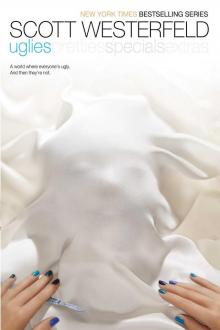 Uglies
Uglies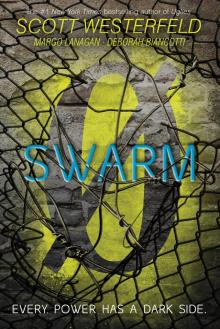 Swarm
Swarm Pretties
Pretties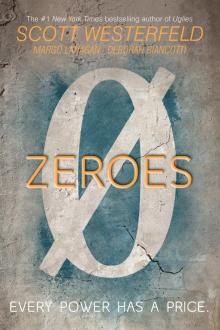 Zeroes
Zeroes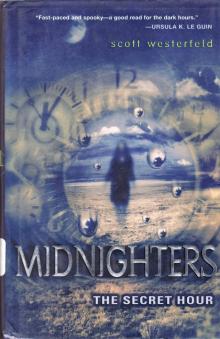 The Secret Hour
The Secret Hour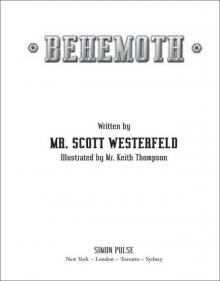 Behemoth
Behemoth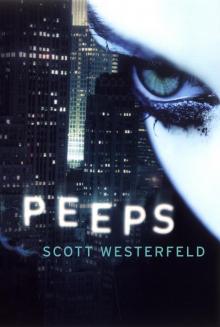 Peeps
Peeps Specials
Specials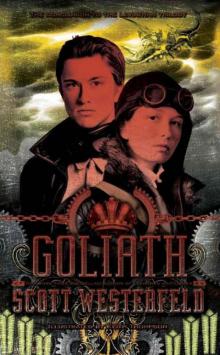 Goliath
Goliath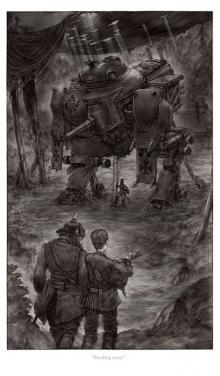 Leviathan
Leviathan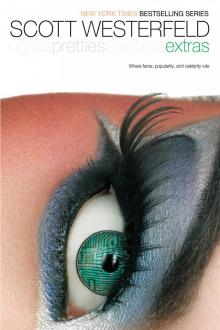 Extras
Extras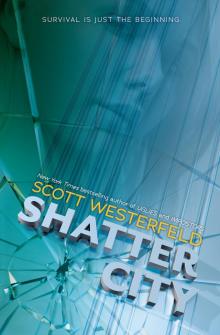 Shatter City
Shatter City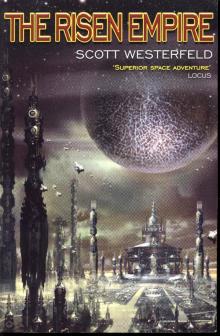 The Risen Empire
The Risen Empire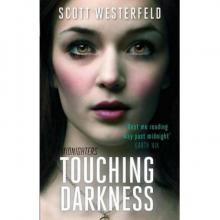 Touching Darkness
Touching Darkness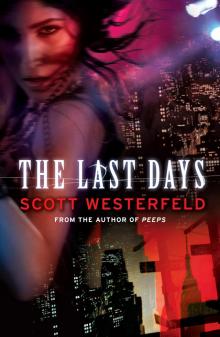 The Last Days
The Last Days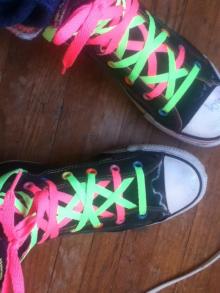 So Yesterday
So Yesterday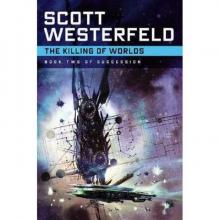 The Killing of Worlds
The Killing of Worlds Afterworlds
Afterworlds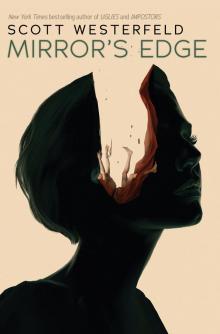 Mirror's Edge
Mirror's Edge Evolution's Darling
Evolution's Darling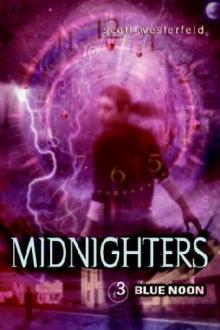 Blue Noon m-3
Blue Noon m-3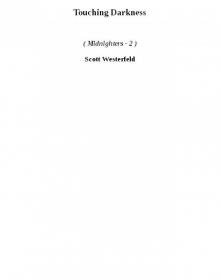 Touching Darkness m-2
Touching Darkness m-2 Impostors
Impostors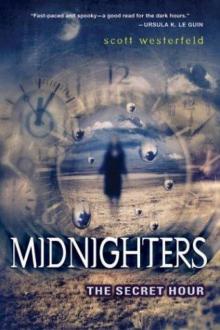 The Secret Hour m-1
The Secret Hour m-1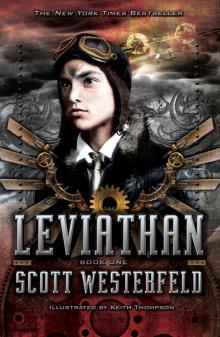 Leviathan 01 - Leviathan
Leviathan 01 - Leviathan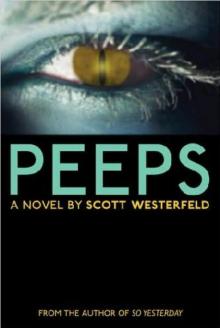 Peeps p-1
Peeps p-1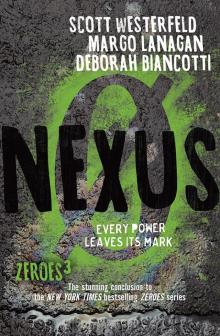 Nexus
Nexus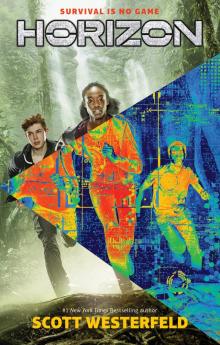 Horizon
Horizon Bogus to Bubbly
Bogus to Bubbly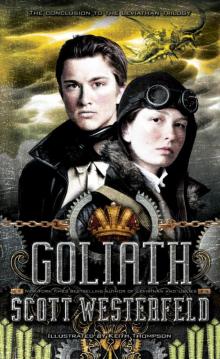 Goliath l-3
Goliath l-3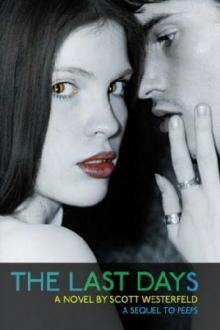 The Last Days p-2
The Last Days p-2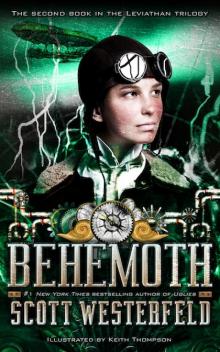 Behemoth l-2
Behemoth l-2 Stupid Perfect World
Stupid Perfect World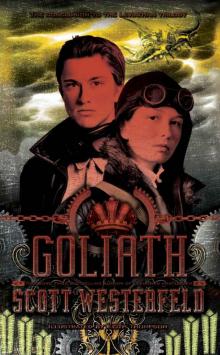 Goliath (Leviathan Trilogy)
Goliath (Leviathan Trilogy)